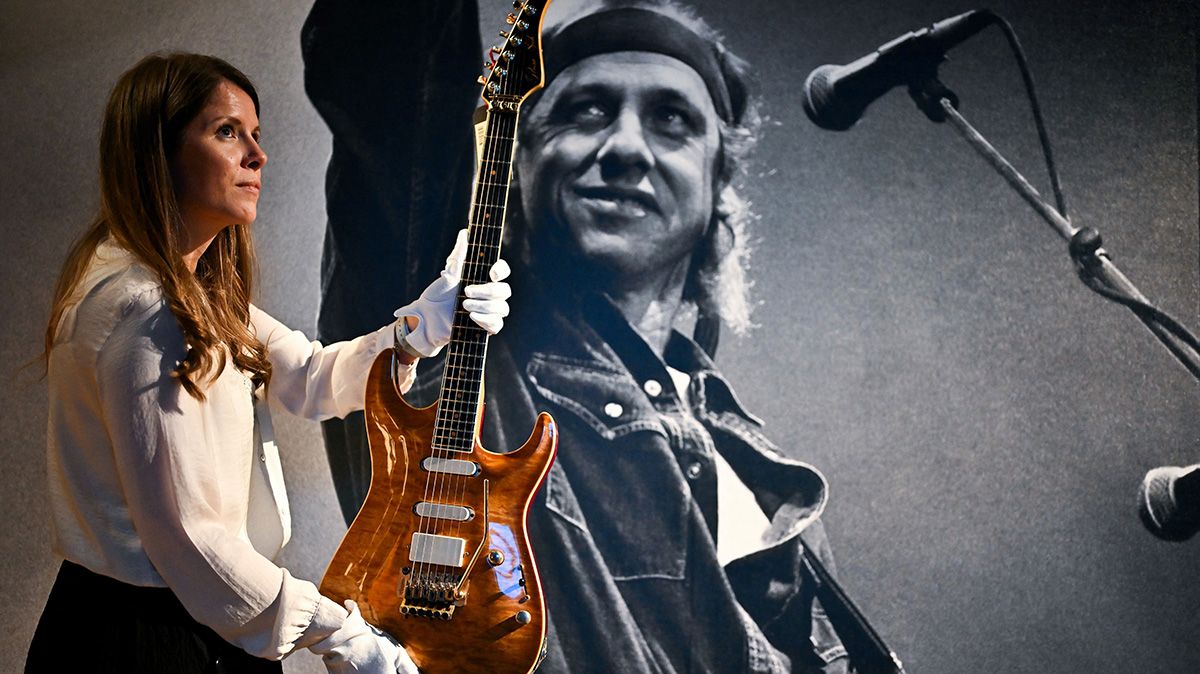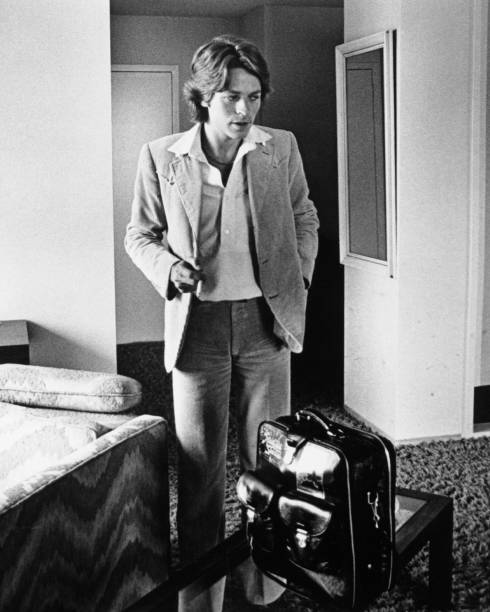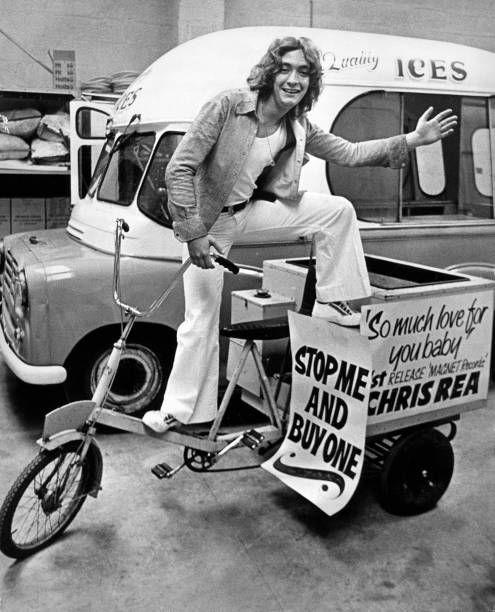Post by petrolino on Feb 3, 2024 1:14:50 GMT
Mark Knopfler
(born 12 August 1949, Glasgow, Scotland; raised also in Blyth and Newcastle upon Tyne, England)

"Mark Knopfler has auctioned off more than 120 of his guitars and amps for a total of more than £8m.
The frontman of the British rock band offered a selection of his instruments spanning his 50-year career at Christie’s Auction House, with 25 per cent of the total price divided equally between charities The British Red Cross, Tusk and Brave Hearts of the North East.
Auction house Christie’s will also donate £50,000 to each of the four charities.
“This auction has been an incredible journey, and I am so pleased that these much-loved instruments will find new players and new songs as well as raising money for charities that mean a lot to me,” Knopfler said."
The frontman of the British rock band offered a selection of his instruments spanning his 50-year career at Christie’s Auction House, with 25 per cent of the total price divided equally between charities The British Red Cross, Tusk and Brave Hearts of the North East.
Auction house Christie’s will also donate £50,000 to each of the four charities.
“This auction has been an incredible journey, and I am so pleased that these much-loved instruments will find new players and new songs as well as raising money for charities that mean a lot to me,” Knopfler said."
- Jabed Ahmed, The Independent
'Guitars and amplifiers belonging to Dire Straits star Mark Knopfler have sold for more than £8m at auction - much higher than had been estimated ... The sale was led by Knopfler's 1959 Vintage Gibson Les Paul Standard, which sold for £693,000, setting a new world auction record for the model.'
- The British Broadcasting Corporation
- The British Broadcasting Corporation
The Mark Knopfler Guitar Collection | Christie's Inc.
|
- - -
Dire Straits ~ 'Inside The Vault'

Mark Knopfler meets Brian Johnson (Geordie & AC/DC) at the Spanish City in Whitley Bay
{ '... and girl it looks so pretty to me ... like it always did ... oh, like the Spanish City to me ... when-a we were kids ...' }
'Down To The Waterline' (1978) [What's On]
'Sultans Of Swing' (1978) [Old Grey Whistle Test]
¬
Sleater-Kinney on Dire Straits [What's In My Bag?]
{ ... featuring Dead Moon, Whitney Houston, Stiff Little Fingers, Bad Brains, The Replacements, Heatmiser, Neil Young and Palehound ... yo ... }
'Lady Writer' (1979) [Pink Pop]
'News' (1979 ... includes a quick-shift cymbal shuffle-fill referenced 44 years later by Paramore in 'The News' ...) [Rockpalast]
'Tunnel Of Love' (1980) [Old Grey Whistle Test]
-
Robert Palmer (born 19 January 1949, Batley, England)

"Robert Palmer was a cool guy and a great R&B and soul singer. I first came across him when I saw him in Dada, a jazz/rock fusion band, who supported Iron Butterfly on their 1971 UK tour. Dada also featured Elkie Brooks, and the pair of singers were soon to form the great Vinegar Joe, who I was lucky enough to see several times in the early 70s. Palmer and Brooks were great together live; the cool, suave Yorkshireman was the perfect complement to Brooks’ fiery, wild and raucous stage persona.
After Vinegar Joe folded, Palmer went on to forge a solo career, achieving particular success in the USA. By the time I saw him again at this gig at Newcastle Mayfair in 1983, he had released 7 albums. The tour was to promote the Pride album, and followed his success in the UK singles chart with Some Guys Have All The Luck which reached No 16, and was his biggest hit to date. The show saw Palmer looking particularly cool in a snappy suit, and singing his blue-eyed soul to an appreciative Newcastle crowd."
- Vintage Rock, Wordpress Weblog
'Work To Make It Work' (1975)
-
Chris Rea (born 4 March 1951, Middlesbrough, England)

"Chris Rea speaks with an accent that’s redolent of derelict shipyards. In fact he’s rich enough, these days, never to work again if he didn’t fancy it. But he’s been too long the underdog. He can’t stop thinking of things in a wary, fatalistic way.
“At the risk of sounding smug – cos I’m always touching wood, I always think that now, the better things get, I keep waiting for some fucker to pull the rug underneath me – but what has happened is that I’m happier for everything that has happened. I regret everything that happened, and I hated it, but at this point in time I’m a very happy man. Cos I do take all that fame thing with a pinch of salt.”
When he laughs, it’s a throaty, crumpled rasp, squeezed and wheezing from his chest. When he laughs, when he’s reminiscing, it’s often the laugh you laugh because the only alternative would be to cry your leg off.
So why did it take him so long? He was, at 22, a late starter. He’d tried in his teens to join a group: “A lad was forming a band, The Elastic Band, which was to be based on the Geno Washington/Cliff Bennett sound, and I was first choice for guitar or bass, whichever I could get the down-payment for. And I was told by me dad I couldn’t have the down-payment until I got me ‘O’ levels. Otherwise it would have started then, which is a shame in some ways.”
After some years of casual labour, which included a stint helping out in the Rea family’s ice cream business, he got a place in hometown band Magdalene (whose line-up, at a different time, featured another local lad, David Coverdale), and later formed Beautiful Losers. He left them in 1977 when he’d secured a solo contract with Magnet Records, the company he remains with to this day. As to the Losers, they went on to win a Melody Maker contest, using Rea’s songs, but further glory appears to have eluded them. “They got buggered upside down,” Rea comments, ruefully.
But when success came Rea’s way, it came quickly. And he didn’t enjoy it.
“Me first album (1978’s Whatever Happened To Benny Santini?) took off in America. The first single (Fool If You Think It’s Over) was Top 10 in America. And the way I always saw it, this thing started to happen underneath me. I was sat on top of it, a big manure heap of bubbling stuff.
“At the risk of sounding smug – cos I’m always touching wood, I always think that now, the better things get, I keep waiting for some fucker to pull the rug underneath me – but what has happened is that I’m happier for everything that has happened. I regret everything that happened, and I hated it, but at this point in time I’m a very happy man. Cos I do take all that fame thing with a pinch of salt.”
When he laughs, it’s a throaty, crumpled rasp, squeezed and wheezing from his chest. When he laughs, when he’s reminiscing, it’s often the laugh you laugh because the only alternative would be to cry your leg off.
So why did it take him so long? He was, at 22, a late starter. He’d tried in his teens to join a group: “A lad was forming a band, The Elastic Band, which was to be based on the Geno Washington/Cliff Bennett sound, and I was first choice for guitar or bass, whichever I could get the down-payment for. And I was told by me dad I couldn’t have the down-payment until I got me ‘O’ levels. Otherwise it would have started then, which is a shame in some ways.”
After some years of casual labour, which included a stint helping out in the Rea family’s ice cream business, he got a place in hometown band Magdalene (whose line-up, at a different time, featured another local lad, David Coverdale), and later formed Beautiful Losers. He left them in 1977 when he’d secured a solo contract with Magnet Records, the company he remains with to this day. As to the Losers, they went on to win a Melody Maker contest, using Rea’s songs, but further glory appears to have eluded them. “They got buggered upside down,” Rea comments, ruefully.
But when success came Rea’s way, it came quickly. And he didn’t enjoy it.
“Me first album (1978’s Whatever Happened To Benny Santini?) took off in America. The first single (Fool If You Think It’s Over) was Top 10 in America. And the way I always saw it, this thing started to happen underneath me. I was sat on top of it, a big manure heap of bubbling stuff.
“I had no control over it; I didn’t know what to do. I’d been in Middlesbrough; I was very happy playing music. And for the two years before I was signed up, I was playing in a group, I had a job in a hamburger place. In summer I’d go to Formentera or Ibiza, and it was great. Then suddenly I was signed up: I didn’t know what the fuck had happened. I wasn’t with anybody from Middlesbrough anymore, I was being asked to do things, and never playing music. I used to get on a plane and go to LA, do radio stations, photo sessions, there was always meetings. And I didn’t know enough about the business to know what was going wrong. The first time I smelled something was, we got a Grammy nomination, I went to the Grammy Awards, and I was the only one there out of anybody I liked. None of the others ever went: Costello was doing a gig up the road, Springsteen was out on tour. I started to think then, there’s definitely two sides to this business. I just kept telling everyone for two years that I didn’t want to do this.”
Rea had been teamed with Elton John’s producer Gus Dudgeon, a sign of the direction his music was expected to go in. “I didn’t get on with Gus Dudgeon in the studio at all: the first album cost millions, so then there was pressure. No one would let go, cos I was the goose that laid the egg, y’know?”
Rea was spending the first years of his professional life being summoned to write a follow-up to Fool If You Think It’s Over: “Oh yeah. That was it. I’d have all sorts of songs, they just hurriedly went through them as if I was some unknown come into the office, like A&R guys do, they’ll whizz through looking for the hook. It was terrible.”
Did he try?
“For my sins, I did. Because I didn’t know what else to do…”
Although the song re-entered the charts a few years later, this time covered by Elkie Brooks, Rea himself soon lost the American market. (He’s only just signed a new contract there – with, of all people, Motown.)"
- Paul Du Noyer, Q (February 1988)
Rea was spending the first years of his professional life being summoned to write a follow-up to Fool If You Think It’s Over: “Oh yeah. That was it. I’d have all sorts of songs, they just hurriedly went through them as if I was some unknown come into the office, like A&R guys do, they’ll whizz through looking for the hook. It was terrible.”
Did he try?
“For my sins, I did. Because I didn’t know what else to do…”
Although the song re-entered the charts a few years later, this time covered by Elkie Brooks, Rea himself soon lost the American market. (He’s only just signed a new contract there – with, of all people, Motown.)"
- Paul Du Noyer, Q (February 1988)
'Tennis' (1980)
“When I did The Old Grey Whistle Test, the other band that was on with me was Dire Straits. I knew that day that that was what I should be doing. But it was too late. If Mark Knopfler had asked me to join them that night, I would have. And I would have gone to court with my record company. But I don’t think my record company would have let me go. They’d have let me starve rather than let me go. Because somebody in Los Angeles had told the head of my record company: ‘Never let that boy go.’ It was quite sinister when you look back. “When someone said: ‘If you’re doing that TV gig, you’ve got to wear a leather jacket,’ I should have just said no to all that. But then I mightn’t have got this far. You’re constantly juggling what you want to do and what you have to do.
“We had all this when I went back to the blues. They all shit themselves. What they didn’t realise is that Chris Rea fans like that. That’s the bit they like, better than the poppier side or trying to have a hit single. One German journalist for a rock magazine said: ‘The best thing you can ever see is a Chris Rea sound-check, because they’re just grooving and playing.’ They used to have to get us off stage: ‘For fuck’s sake, we’re opening the doors.’ We’re playing away, happy as pigs in shit – because we love it.”
“We had all this when I went back to the blues. They all shit themselves. What they didn’t realise is that Chris Rea fans like that. That’s the bit they like, better than the poppier side or trying to have a hit single. One German journalist for a rock magazine said: ‘The best thing you can ever see is a Chris Rea sound-check, because they’re just grooving and playing.’ They used to have to get us off stage: ‘For fuck’s sake, we’re opening the doors.’ We’re playing away, happy as pigs in shit – because we love it.”
- Chris Rea, Louder (October 2017)
Chris Rea performs 'Whatever Happened To Benny Santini?' (1978) [Old Grey Whistle Test]
¬


